08 de fevereiro de 2026
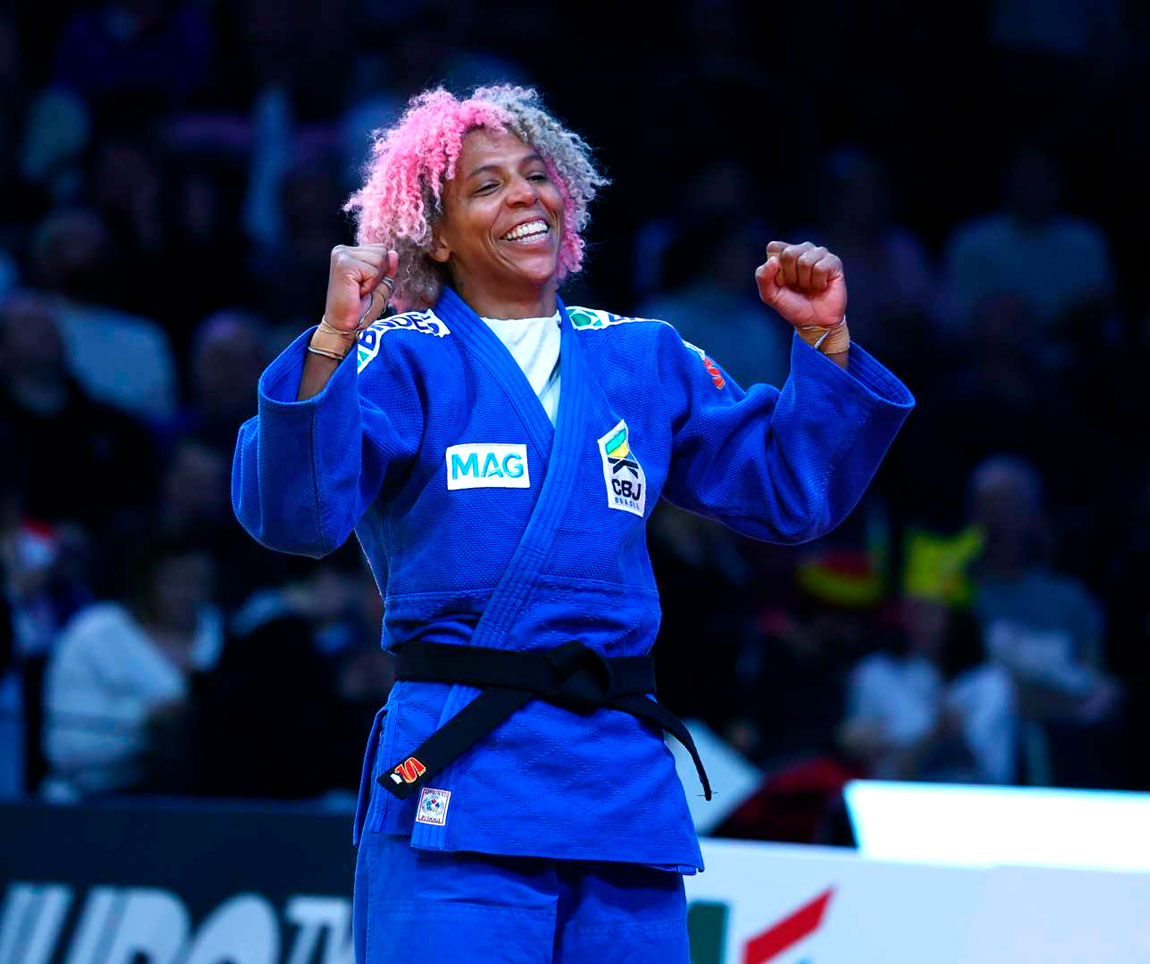
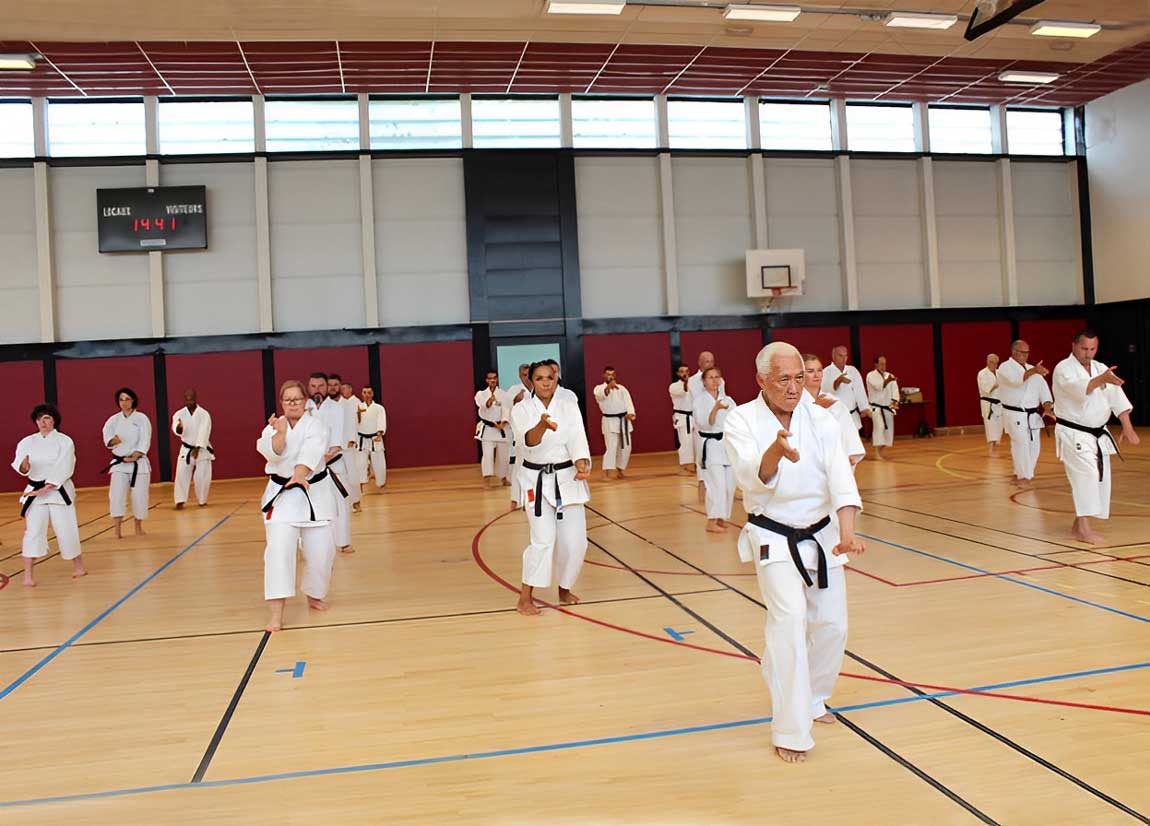 Kittei kata class, in front of the group is Sensei Chan Chau Tran from Canada © ITKF Archives © ITKF Archives
Kittei kata class, in front of the group is Sensei Chan Chau Tran from Canada © ITKF Archives © ITKF Archives
Organized by ITKF France, the 32nd edition of the European Master Course was held with great success from May 28 to June 2. The event took place at the renowned Gymnase Maryse Hilsz, located in the Charonne district of Paris, and brought together over 60 instructors from 13 countries for an innovative program that blended sport science, budo philosophy, and advanced traditional karate techniques.

Some of the instructors registered at the opening of the training sessions of the 2025 Paris Master Course © ITKF Archives
The summer camp — also known as Camp d’Été or Summer Gasshuku — was promoted by the Traditional and Budo Karate Federation of France and featured a groundbreaking format. Carefully designed, the program offered a unified structure combining practical and theoretical activities essential for the technical, philosophical, and pedagogical development of participants. The curriculum was divided into three core components:
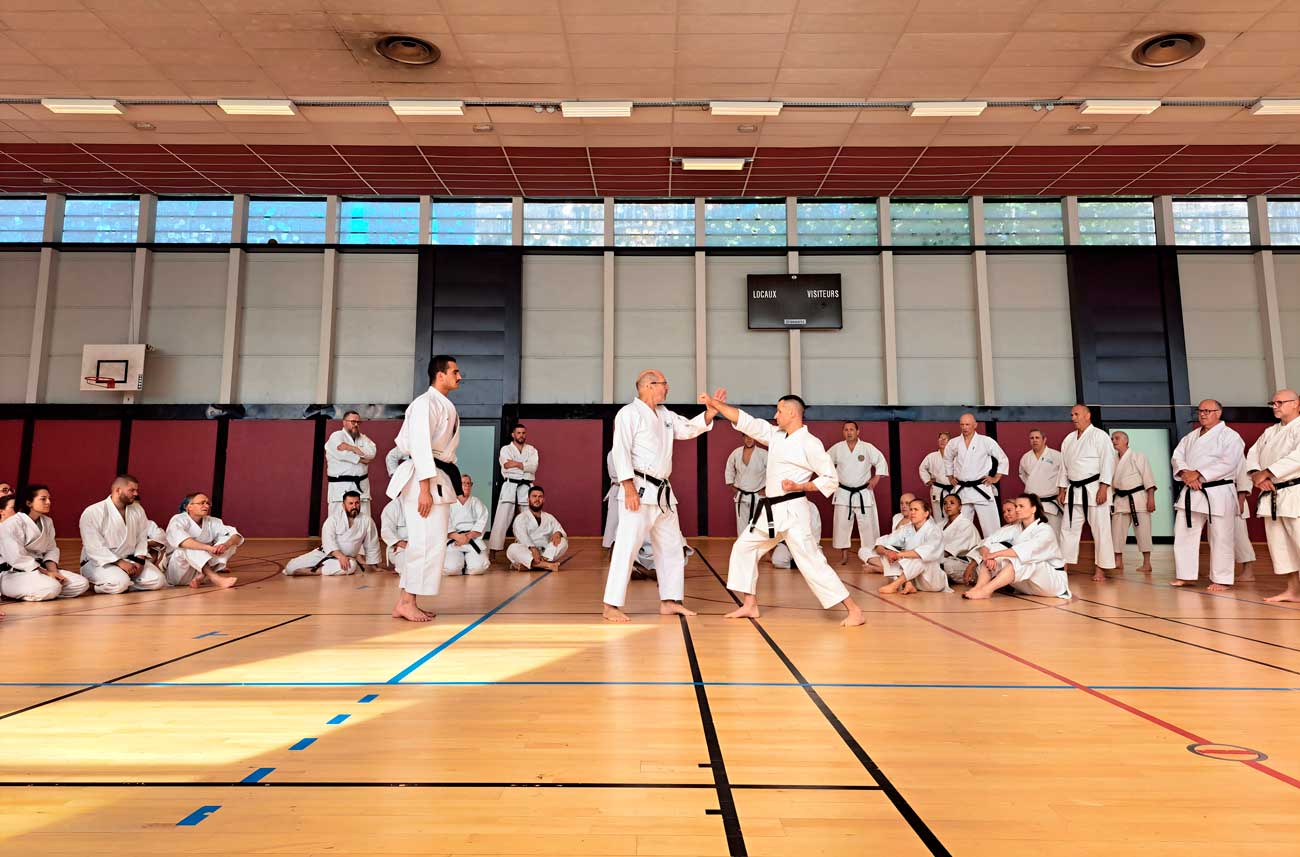
Gilberto Gaertner leads the self-defense training session © ITKF Archives
GENERAL COURSE: Application of traditional karate principles across various technical groups, following the newly structured system established by ITKF Global.
INSTRUCTOR COURSE: Exploration of karate as an educational art and budo path, emphasizing teaching methods, core values, and refereeing.
SEMINAR FOR COACHES AND SPECIAL COURSE FOR ATHLETES: A practical-technical module geared toward high-performance development, including instruction strategies and emotional control on the tatami.
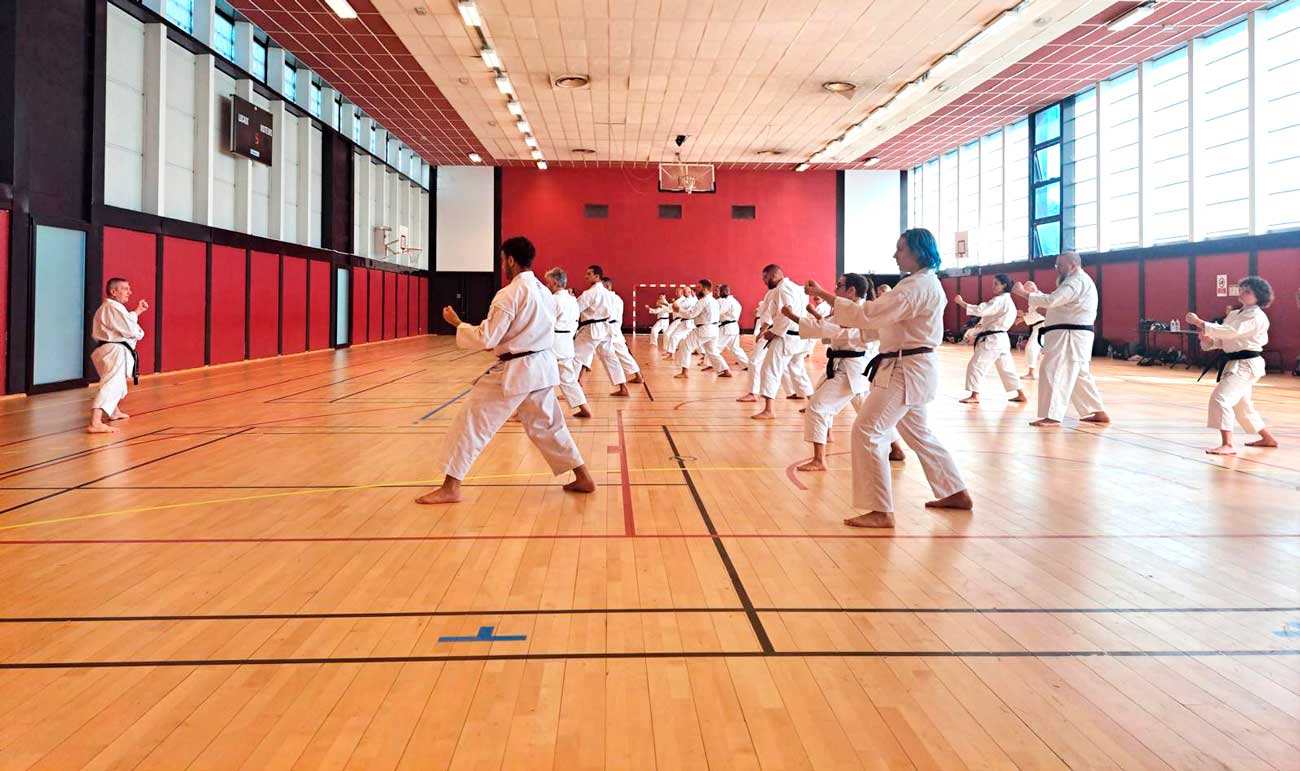
Professor Eligio Contarelli teaches the fundamentals of kihon © ITKF Archives
According to ITKF Global Technical Committee, “The integration of theory, practice, and philosophy is what sets traditional karate apart as a complete educational path. By unifying content into structured modules, we ensure high-quality technical training aligned with budo principles.”
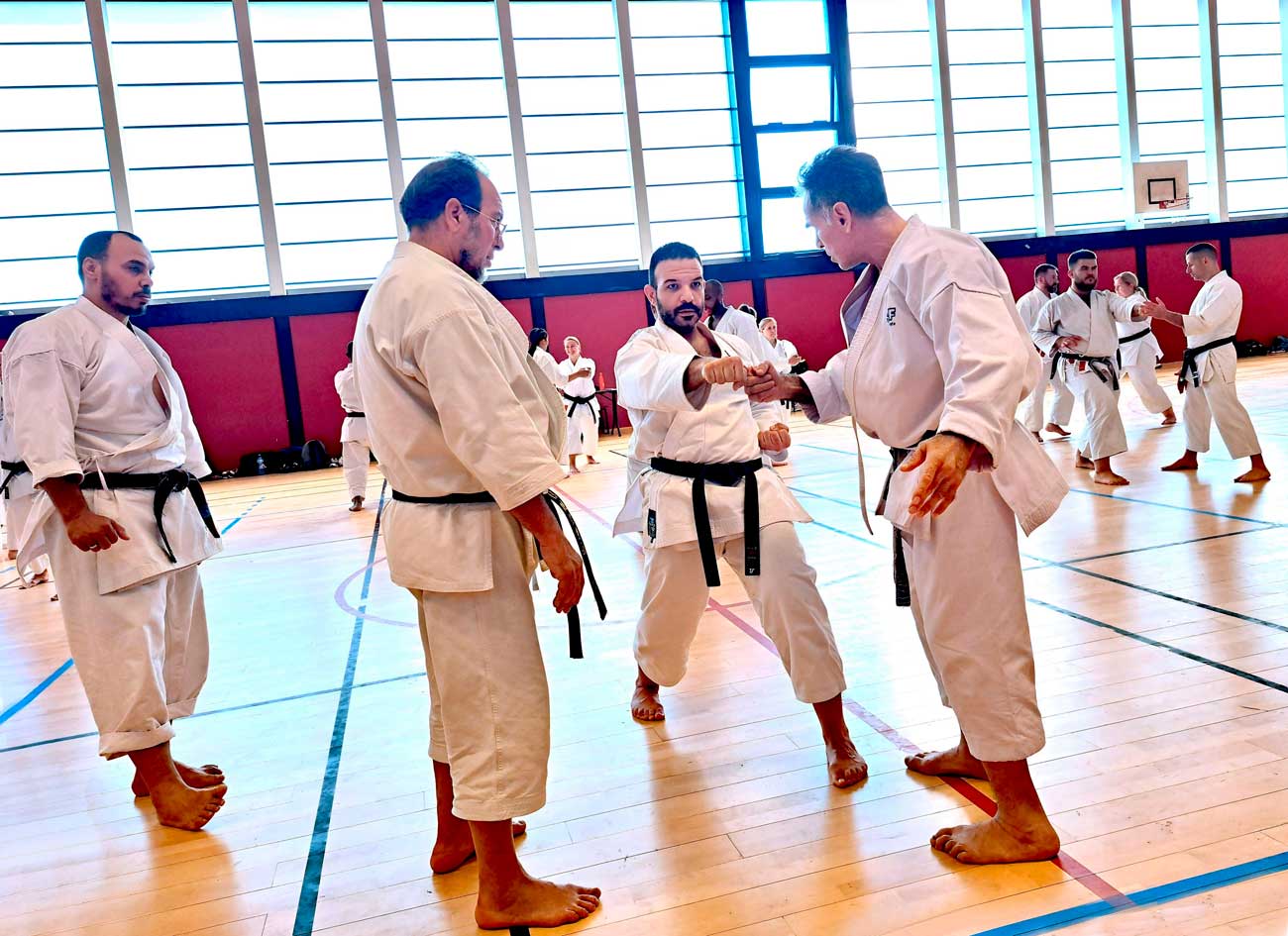
Sensei Justo Gomez presents advanced kumite concepts, sharing his extensive experience in ITKF Global karate © ITKF Archives
From the perspective of Shihan Gilberto Gaertner, Chairman of ITKF Global, “This structured curriculum consolidates an international teaching model that honors tradition while embracing scientific advancements. It represents a strategic step toward the global standardization of technical, pedagogical, and philosophical education across our organization.”
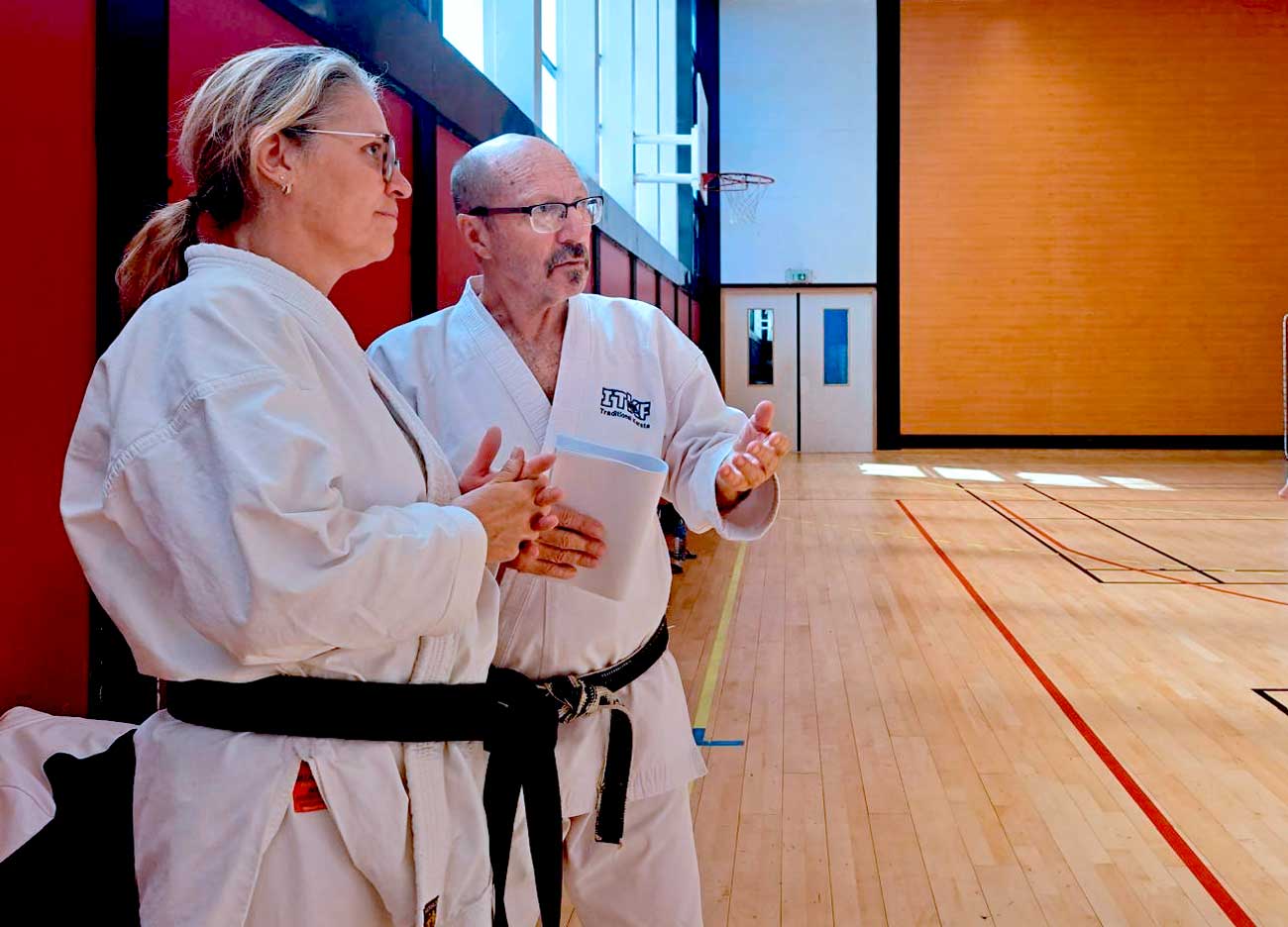
Sandrine Le Corre-El Marhomy, president of the French Federation of Traditional Karate and Budo and host of the 32nd European Master Course, speaks with ITKF Global Chairman Shihan Gilberto Gaertner about technical and organizational aspects of the event © ITKF Archives
According to ITKF Global Technical Committee, the 2025 edition focused on the consistent expansion of the official examination program. This year, content was tailored specifically for san-dan (3rd dan) and yon-dan (4th dan) exams. Technical classes were led by Senseis Eligio Contarelli (kihon), Justo Gomez (kumite), and Gilberto Gaertner (waza – self-defense). Refereeing workshops and evaluations for examiner-judges and coaches were also conducted.
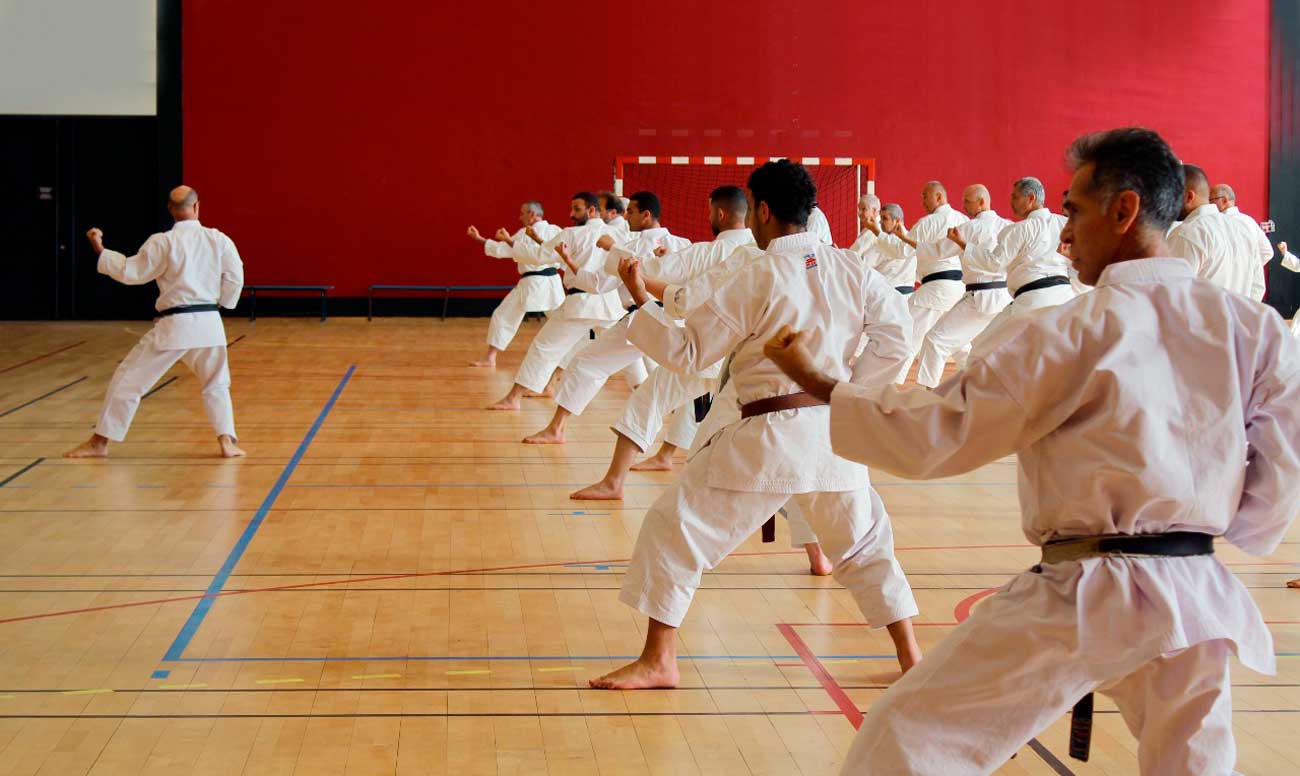
2025 Master Course © ITKF Archives
Israeli Sensei Eyal Nir delivered a lecture on the state of Mushin (“mind without mind”), a core Buddhist concept in budo that enables automatic, unblocked action — the renowned “flow state.” Recent neurophysiological studies suggest that this state reduces activity in the prefrontal cortex (transient hypofrontality), facilitating instinct-based, rapid decision-making.
Nir emphasized that Mushin is the result of repetitive practice, as it allows conscious thoughts—such as fear, doubt, or anger—to dissipate, creating room for immediate and fluid reactions—the very essence of refined combat.
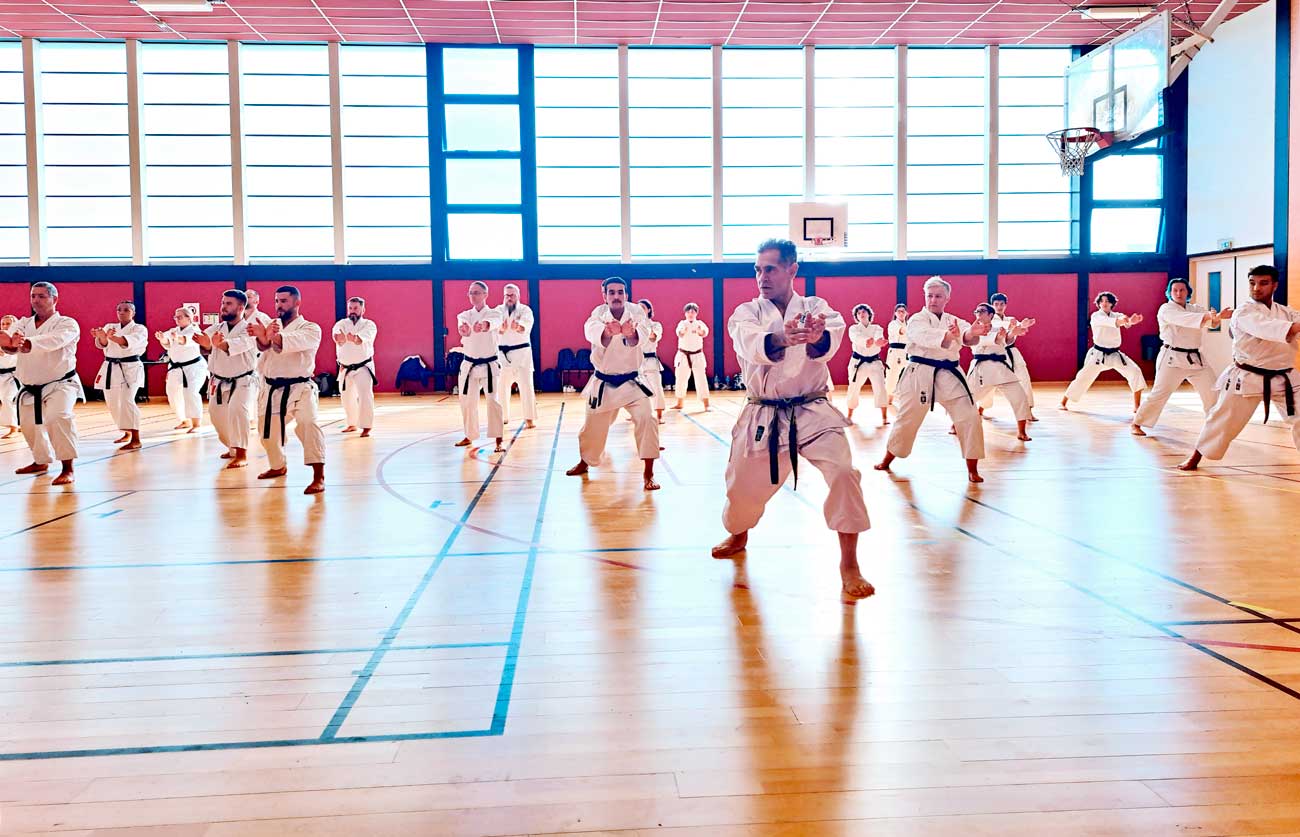
2025 Master Course © ITKF Archives
One of the most praised moments of the event was the presentation by Eric Bortels of Belgium, who shared his inclusive karate methodology. His model goes beyond competitive para-karate and includes both individuals with physical disabilities and those with neurodivergent conditions, such as Attention Deficit Hyperactivity Disorder (ADHD), Autism Spectrum Disorder (ASD), and Down syndrome.
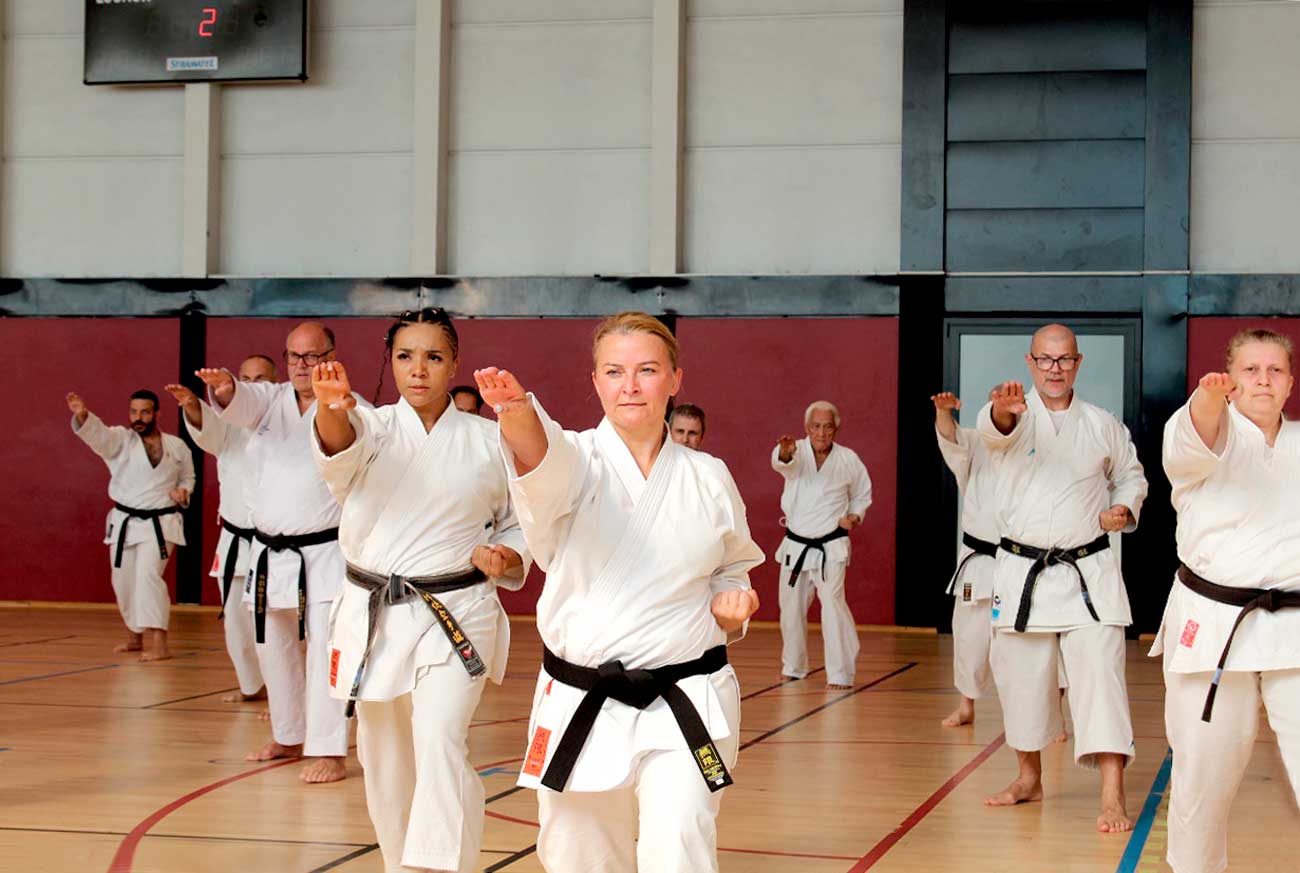
2025 Master Course © ITKF Archives
His proposal includes pedagogical adaptations such as the use of visual cues, pictograms placed on the dojo floor, and color-coded tatami mats. Additionally, it incorporates a robust framework scientifically validated by the Erasmus+ IKONS project. The method has been tested in schools and support centers, demonstrating a high level of engagement and exceptional adaptive quality.

2025 Master Course © ITKF Archives
Bortels explained, “Inclusive karate addresses all types of neurodivergence and physical limitations. It is a quality program, scientifically supported—not just competitive, but socially inclusive.”
Roman Pavlovic, a member of ITKF Global Board of Directors and Chairman of ITKF Europe, took part in the 32nd Master Course in France. He emphasized the event’s formative impact and the relevance of the inclusive approach presented by Eric Bortels. In his statement, Pavlovic captured the spirit of the gathering with precision:
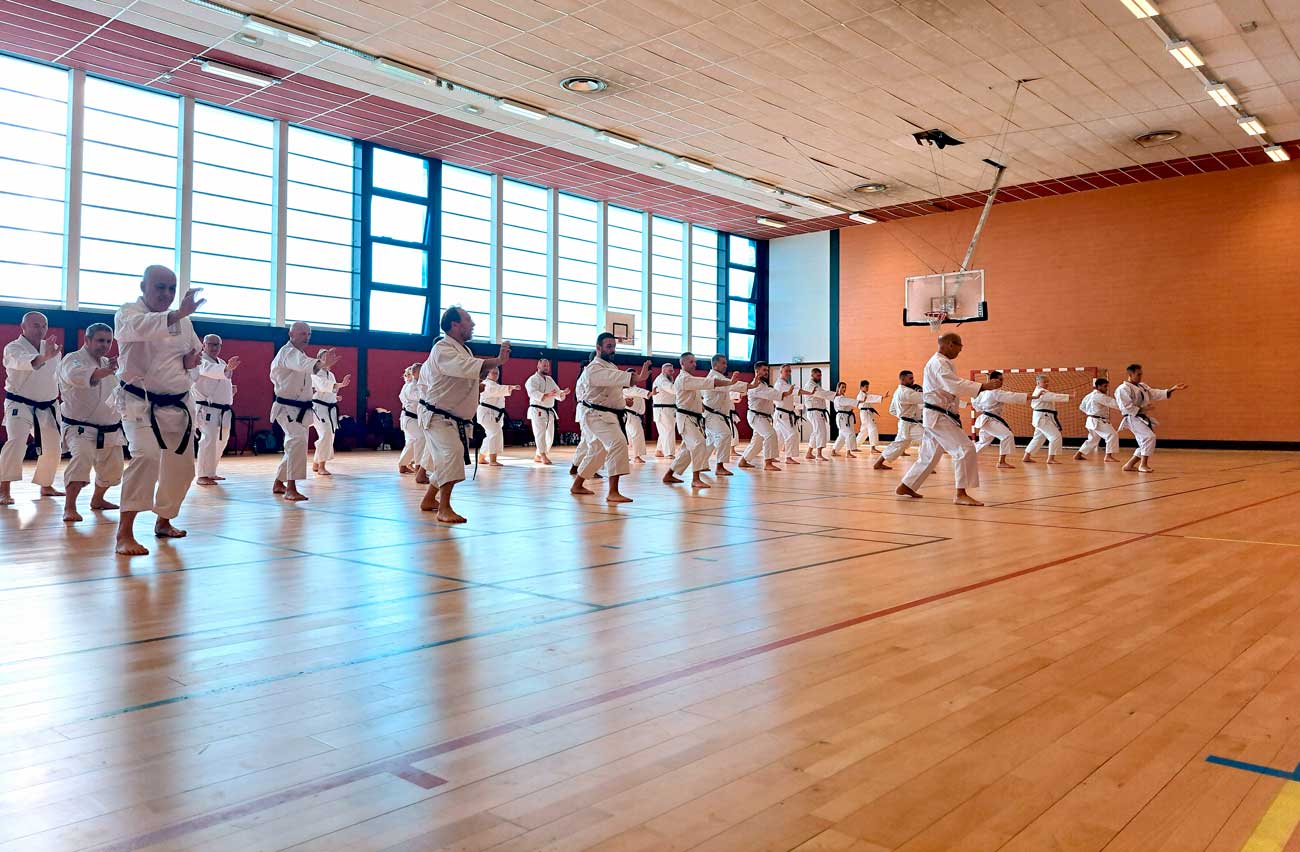
2025 Master Course © ITKF Archives
“The 32nd ITKF Master Course in France once again exceeded all expectations! The members of the ITKF Technical Committee deepened our understanding of karate fundamentals—self-defense, kihon, kata, kumite, and essential insights into refereeing—through highly qualified theoretical and practical approaches.
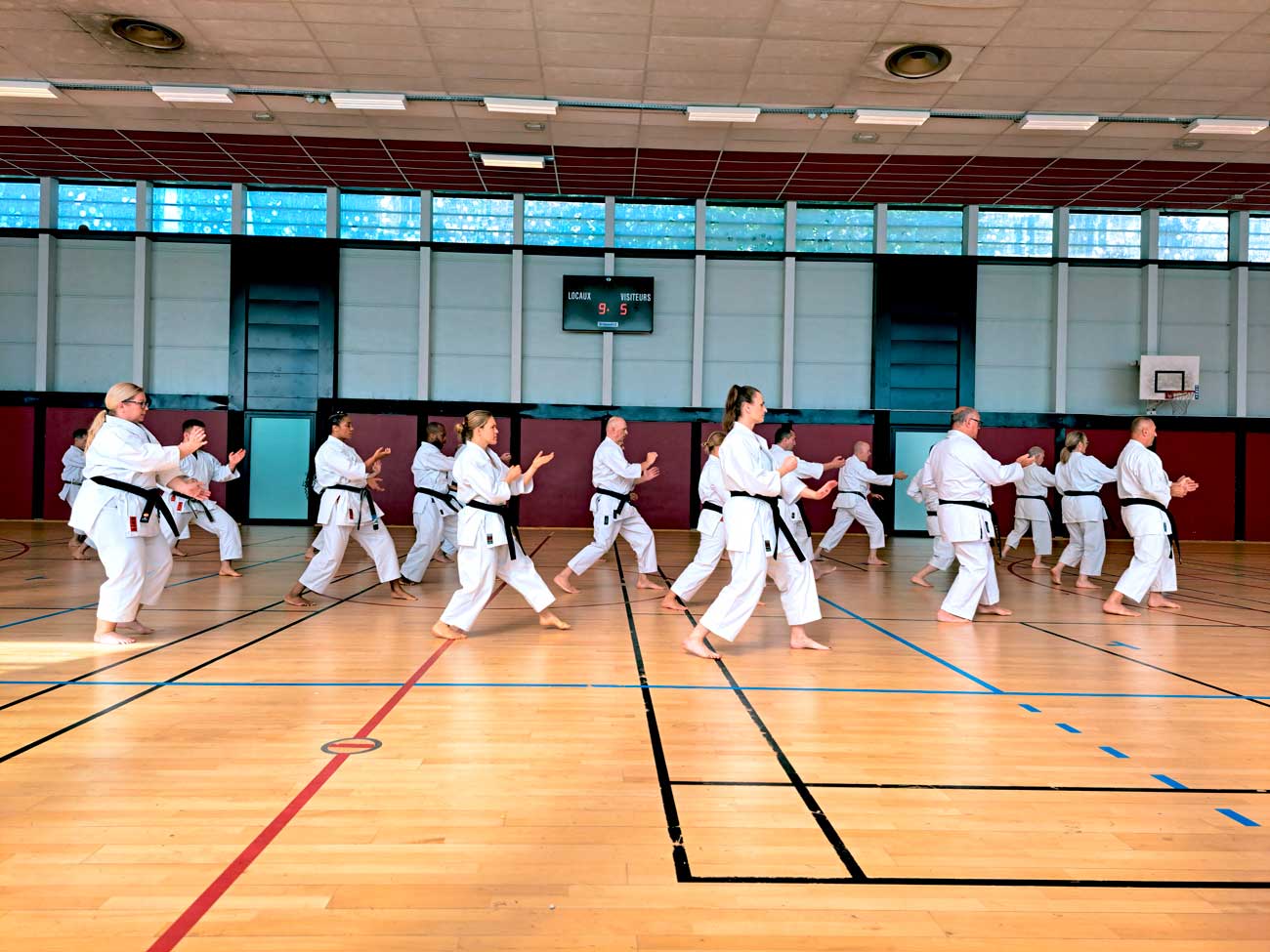
2025 Master Course © ITKF Archives
The highlight of the event was undoubtedly the presentation by Eric Bortels of IKG, who shared valuable insights into inclusive karate, offering a systematic approach to training practitioners with physical disabilities and neurodivergent profiles.
These four days were truly transformative, providing an intense and enriching experience for body, mind, and spirit. My sincere congratulations to the dedicated team at ITKF France, whose meticulous organization and unwavering support created the ideal environment for training, learning, and connecting—not just as karate enthusiasts, but as human beings. We already look forward with great enthusiasm to next year’s inspiring edition!”
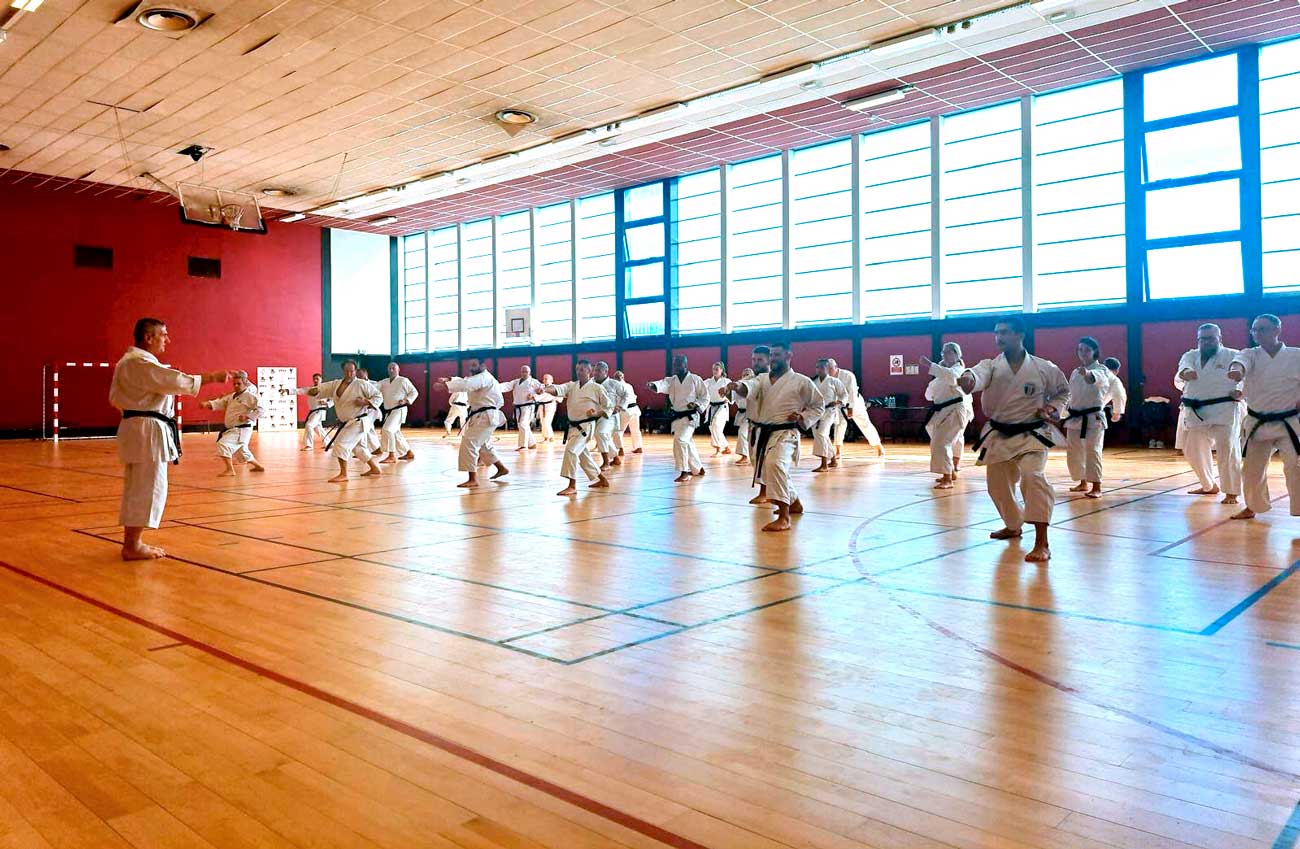
2025 Master Course © ITKF Archives
Sandrine Le Corre-El Marhomy, head of French Federation of Traditional and Budo Karate and host of the 32nd European Master Course, celebrated the event’s success, held under the auspices of ITKF Global and ITKF Europe.
“The 32nd ITKF Summer Camp was once again the largest international gathering of Traditional Karate in Europe, bringing together practitioners from around the world for four days of intensive training aimed at deepening technical knowledge and experiencing the ethical values of Budo—while respecting the pedagogical framework of ITKF.

Professor Justo Gomez conducts the final rei © ITKF Archives
We welcomed delegations from Brazil, Poland, France, Algeria, Argentina, Canada, Portugal, Italy, Israel, Romania, Egypt, Belgium, and Slovenia, along with the President of ITKF Asia-Oceania, members of the European board, and the President of ITKF Europe.
I sincerely thank all these delegations for their ongoing loyalty, active engagement, and invaluable contribution to the technical and human richness of our seminar.
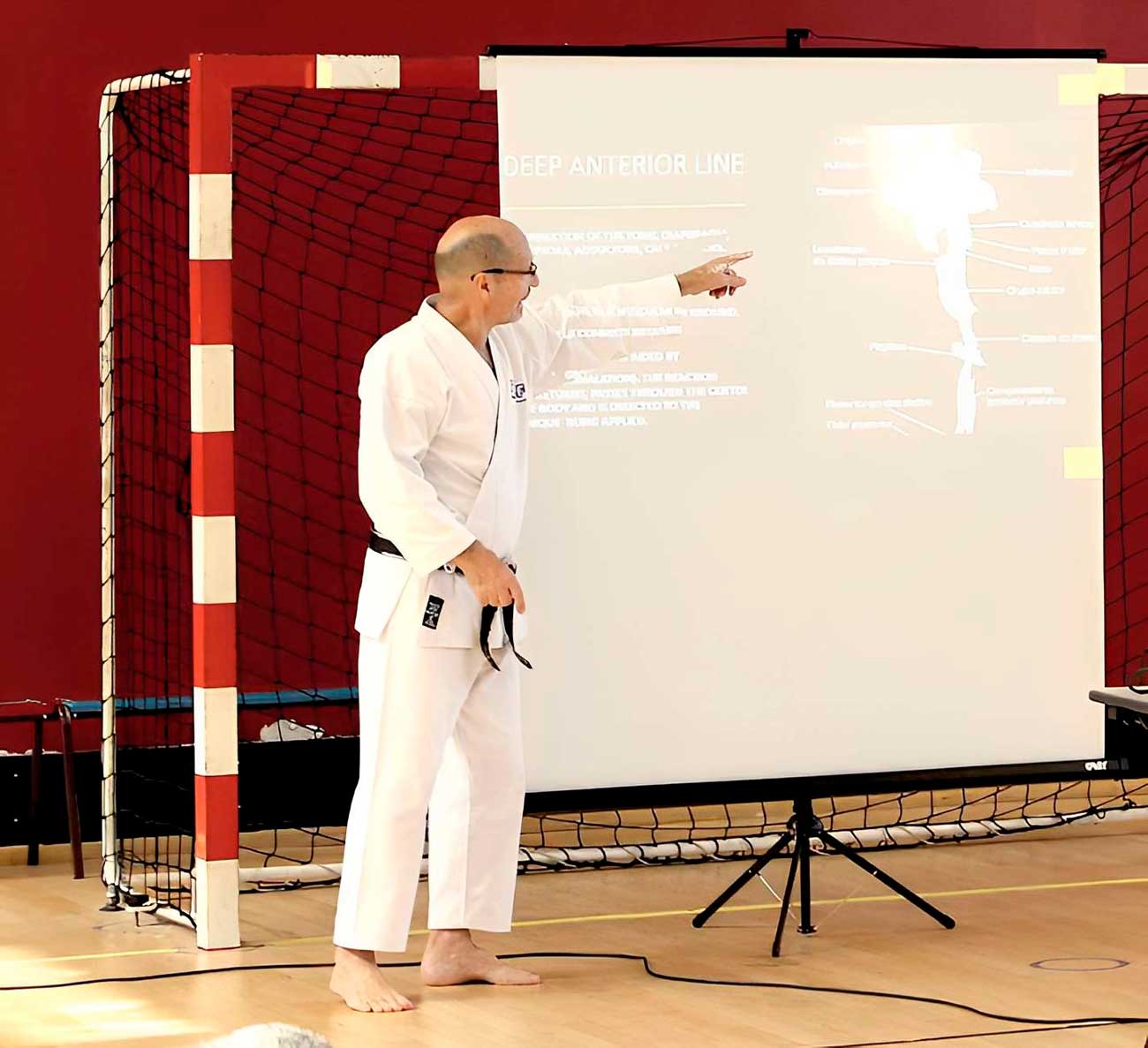
Applied neurophysiology class © ITKF Archives
We express our deepest gratitude to ITKF Technical Committee, whose instructors transmitted the essence of traditional karate with passion, precision, and generosity. Each session became a moment of technical improvement, philosophical reflection, and human connection. The event featured symbolic highlights such as the opening ceremony attended by Epara Epency, Director of Sports for Paris’s 20th District; a meeting with Ms. Evelyne Ciriegi, President of the Île-de-France Regional Olympic and Sports Committee; and the presence of David Reybier, a leader in sports and social inclusion initiatives.”
One of the most impactful moments of the event was the final day dedicated to Traditional Inclusive Karate, brilliantly presented by Eric Bortels of Belgium. His proposal enabled practitioners from different backgrounds and skill levels to share the tatami, reinforcing the principle that Budo must serve everyone. In doing so, the ITKF Summer Camp has established itself as an essential annual event for the global traditional karate community.
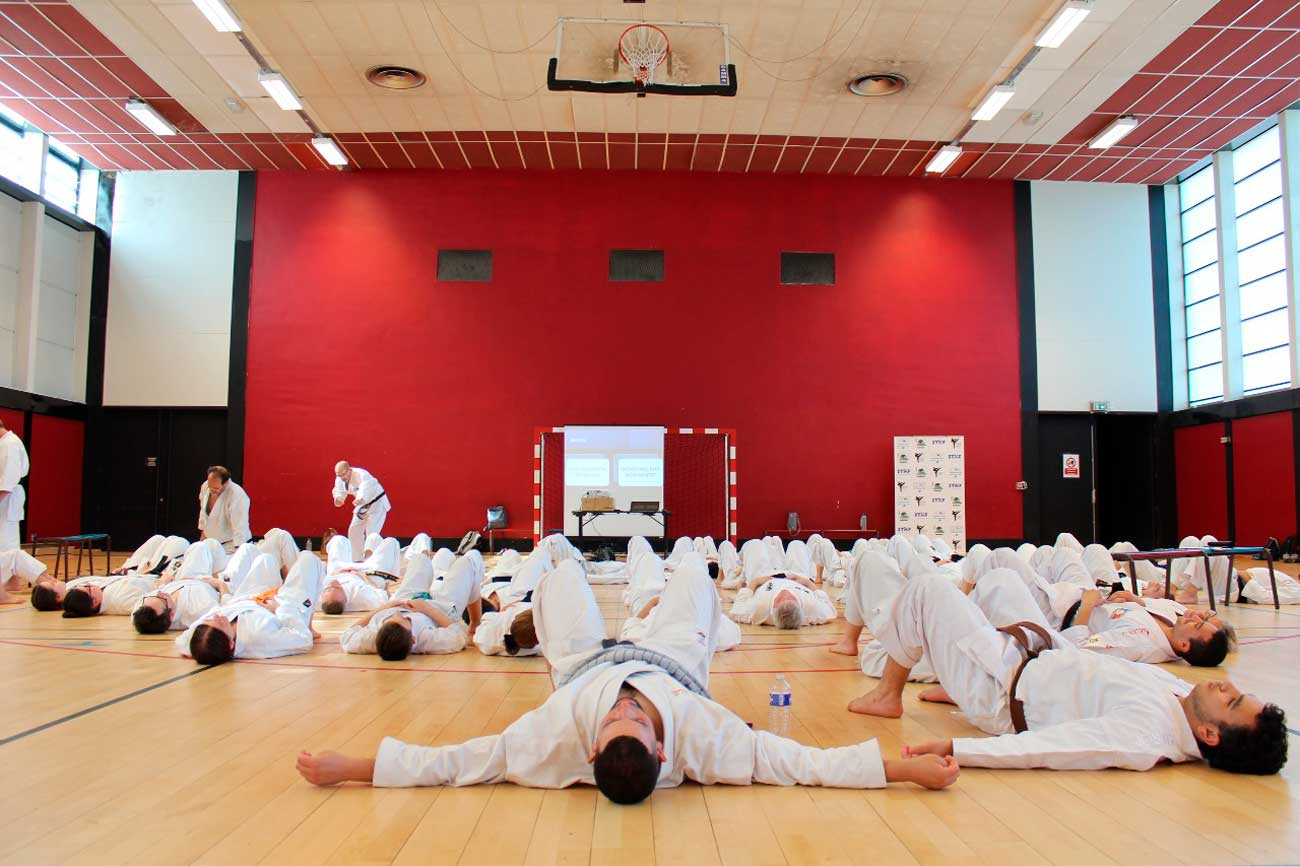
Breathing training session © ITKF Archives
“We now look to the future with great enthusiasm and a proposal to further expand the content of the Master Course by incorporating experts in health sciences, biomechanics, inclusion, and martial philosophy—to benefit both technical knowledge and the human development of all participants.”
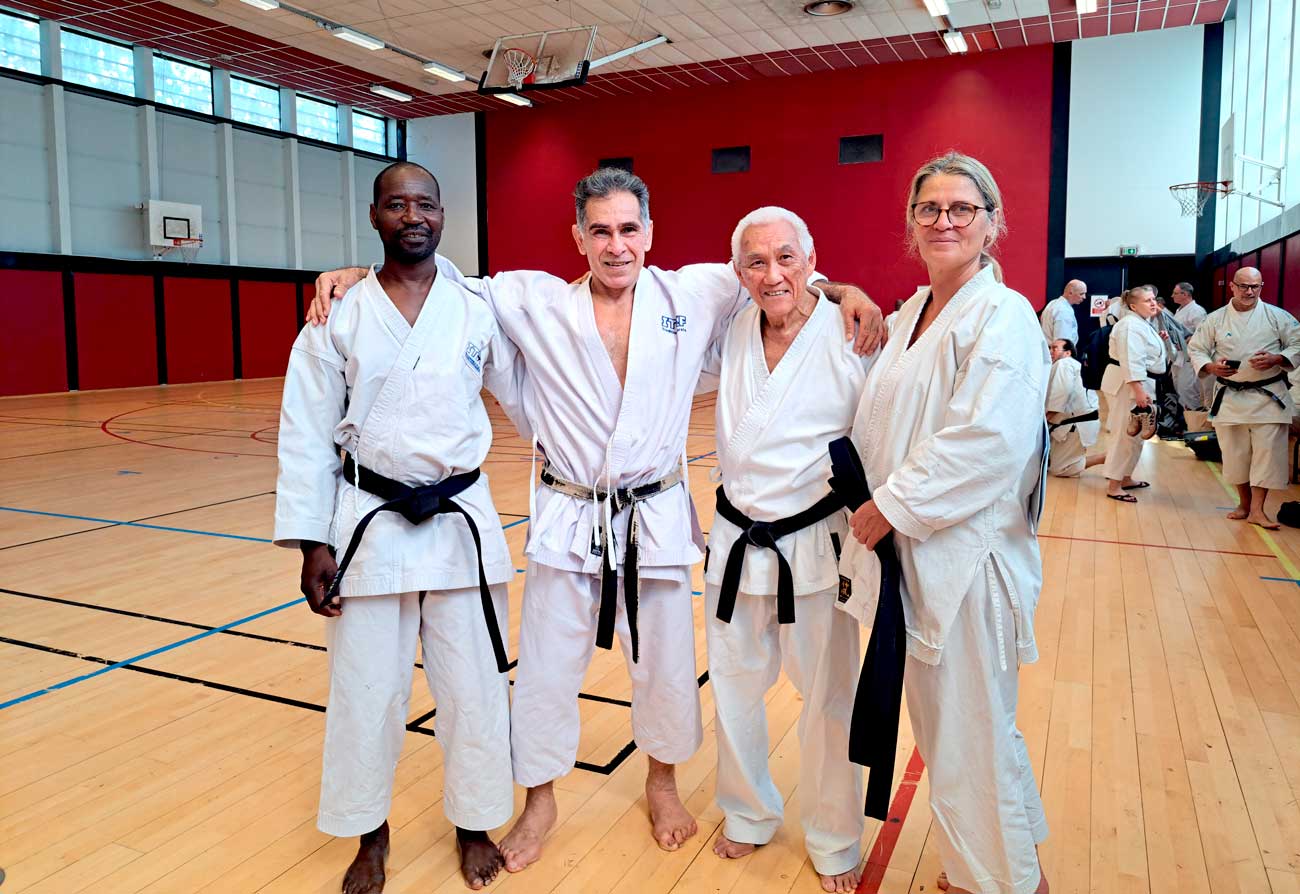
Niakate Makan, Justo Gomez, Chan Chau Tran, and Sandrine El Marhoumy © ITKF Archives
For Fernando Silva, Chairman of ITKF Portugal and current Vice-President of ITKF Europe, this year’s European edition of the Master Course marked a remarkable advancement in content, organization, and the projection of traditional karate’s core values.
“The course in Paris went far beyond what is traditionally expected from a technical seminar. The training sessions were designed with an integrated approach, combining biomechanics, postural alignment, and mental development—three fundamental pillars of performance in karate,” he assessed.
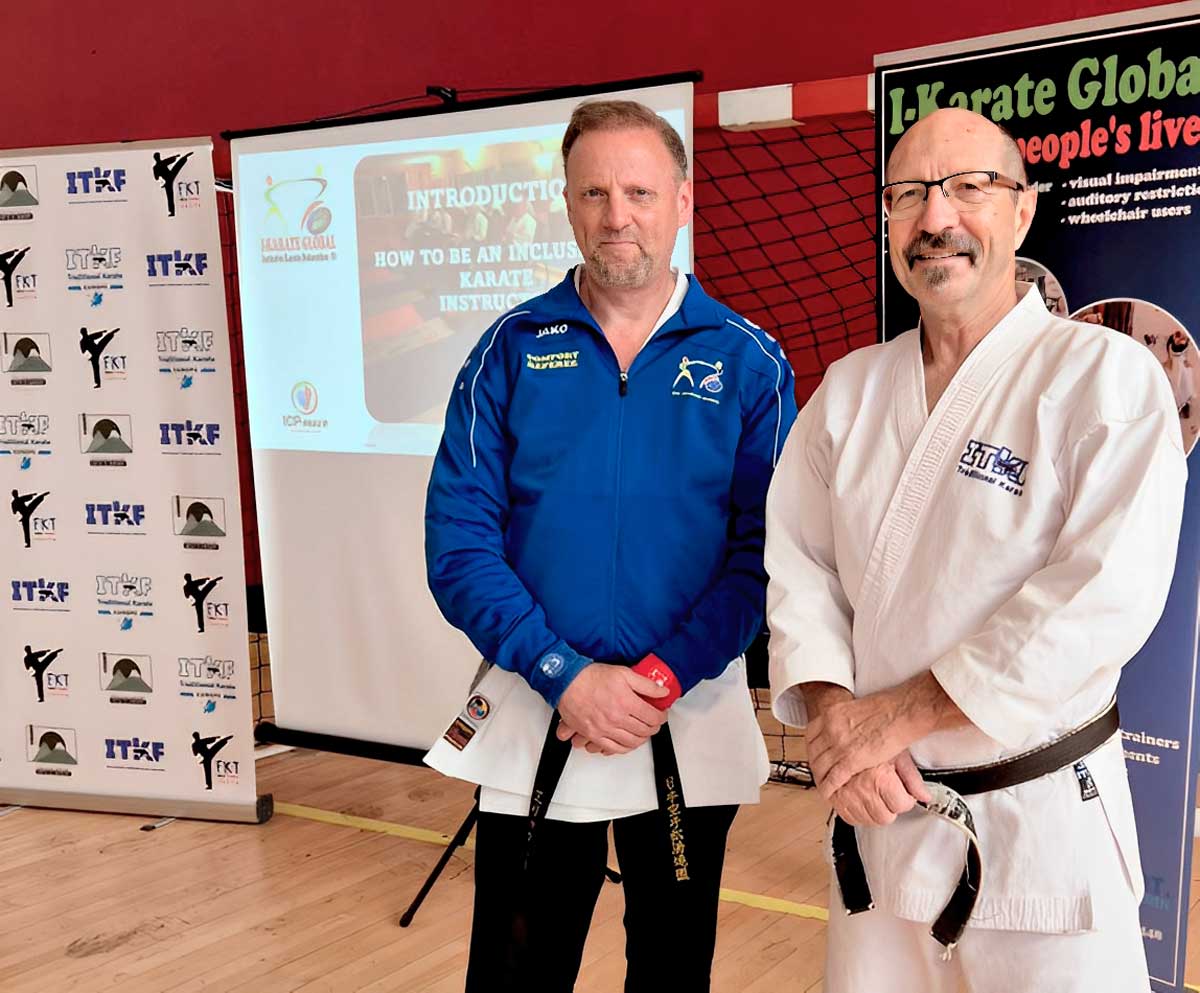
Eric Bortels and Gilberto Gaertner open the lecture on inclusive karate © ITKF Archives o
According to the leader, body movement was explored with rare depth.
“Biomechanics was applied in a practical way, allowing participants to understand how to generate power and fluidity through correct hip usage, grounding techniques, and the precise alternation between relaxation and contraction. The result is more efficient and safer techniques.”
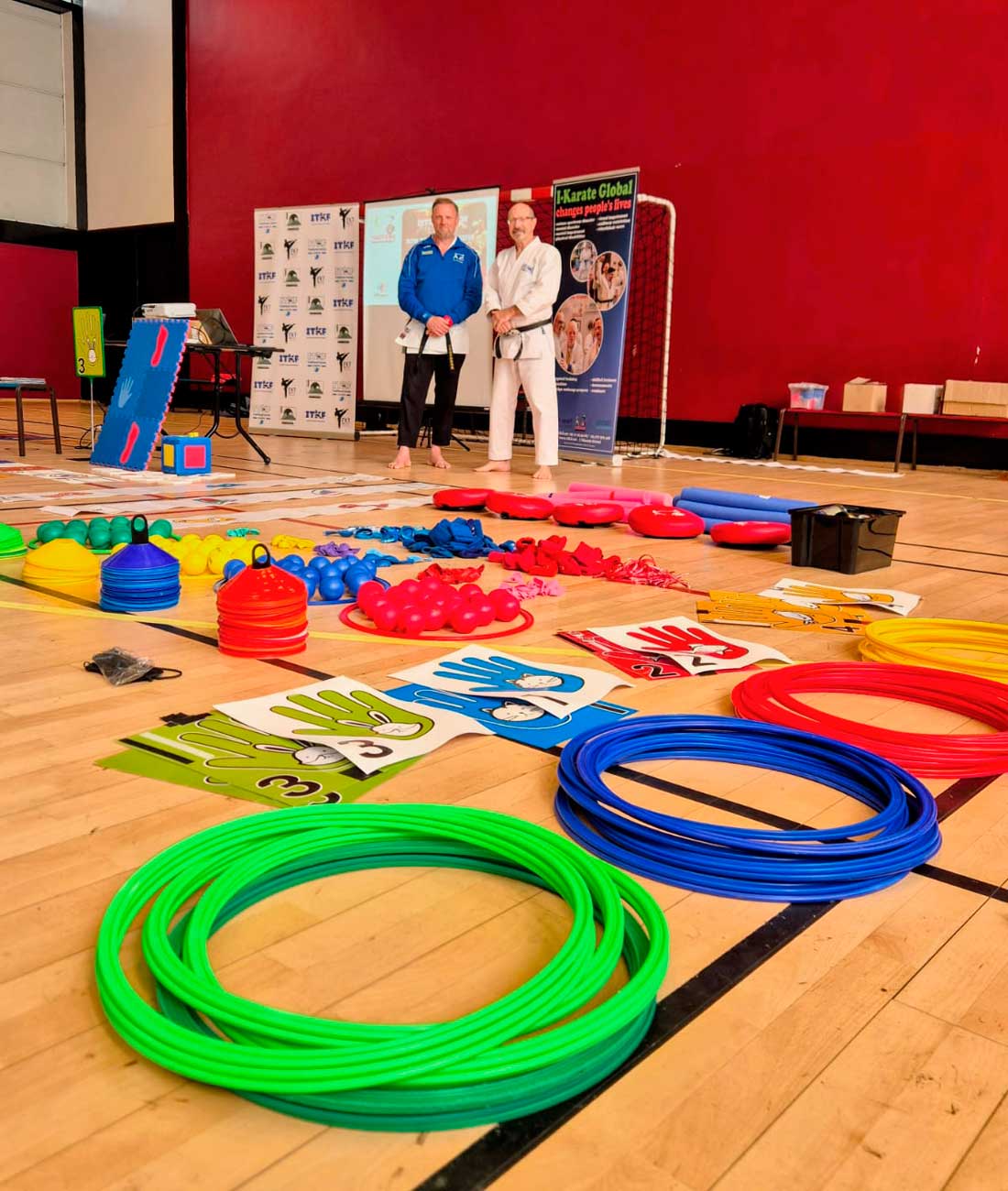
Part of the inclusive karate teaching material used by Eric Bortels, from IKG © ITKF Archives
Another highlight, according to Silva, was the emphasis on posture as the foundation of efficiency.
“Postural correction is no longer seen merely as a matter of form or aesthetics, but rather as a precondition for balance, stability, and optimized strength in movement.”
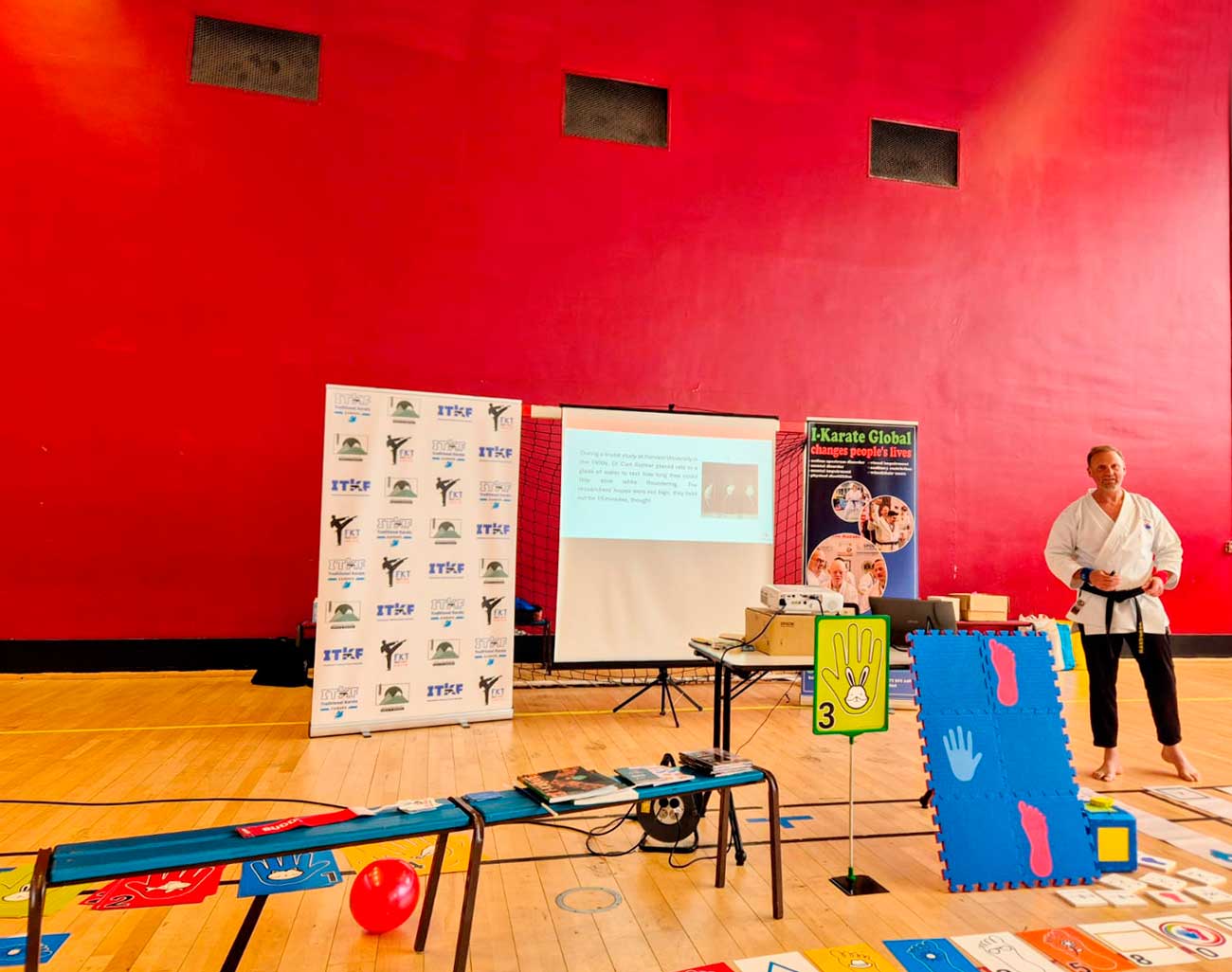
Eric Bortels presents concepts and practices of Inclusive Karate © ITKF Archives
However, in his view, the most symbolic moment of the event was the introduction to Inclusive Karate.
“The inclusive approach touched everyone present. It became clear that karate can be a transformative tool for individuals with physical or mental disabilities, provided that there is a sound methodology, pedagogical sensitivity, and a genuine commitment to inclusion. This projects karate as a truly universal martial art.”
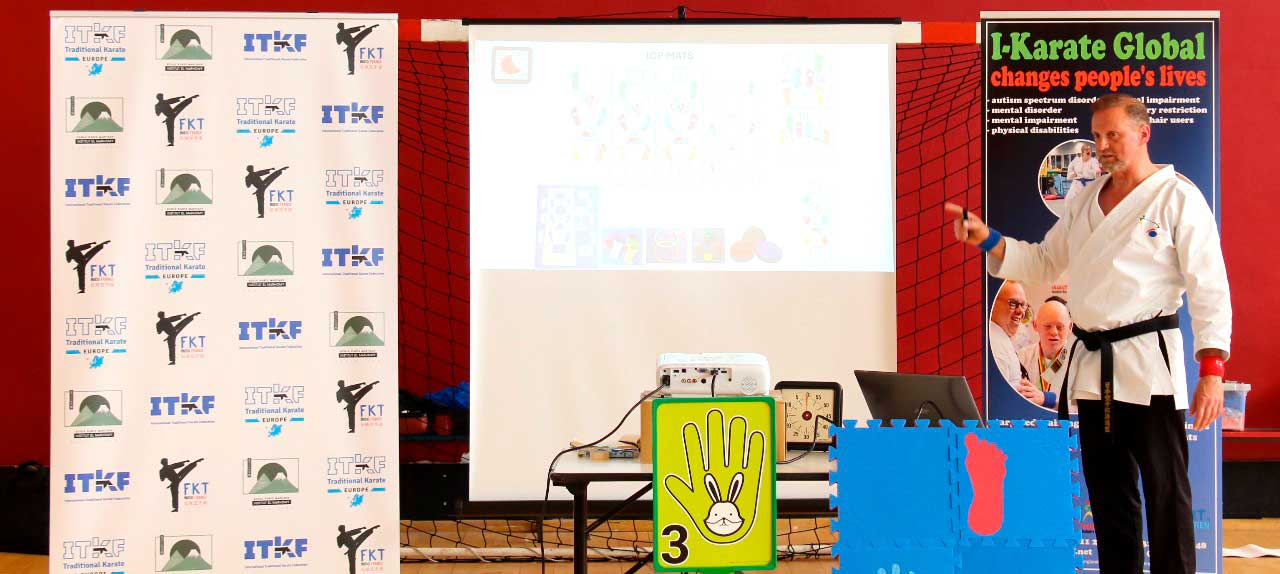
Eric Bortels shares pedagogical experiences focused on accessibility and inclusion in karate © ITKF Archives
For Fernando, the atmosphere of respect and camaraderie that marked the four-day event embodies the most valuable aspects of Budo.
“The exchange of experiences among participants from different countries and cultures, both on and off the tatami, and the spirit of cooperation created the ideal setting to reaffirm the values that sustain our practice.”
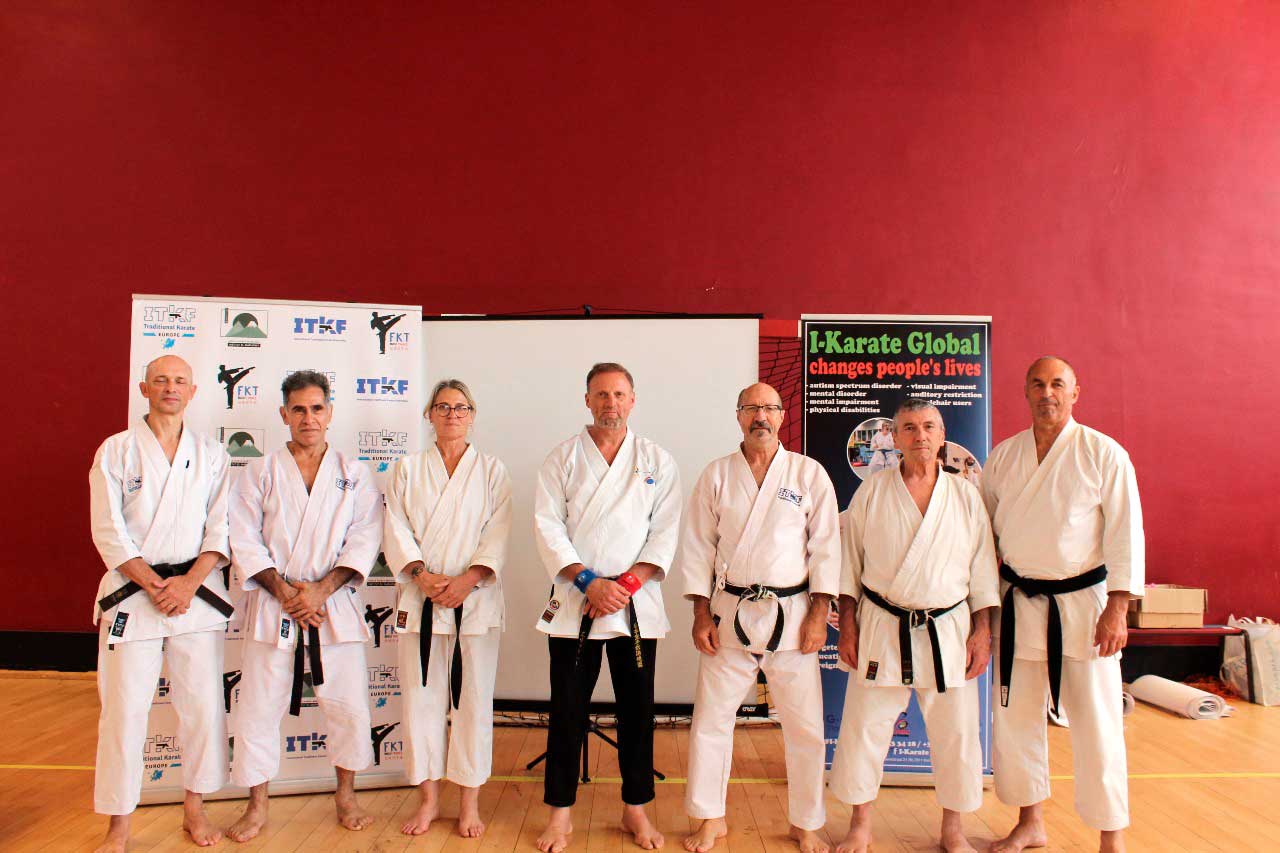
Roman Povlovic, Justo Gomez, Sandrine El Marhoumy, Eric Bortels, Gilberto Gaertner, Eligio Contarelli, and Bozan Marincek celebrate the inclusive karate presentation © ITKF Archives
In sum, the ITKF Global Master Course in Paris was a complete and enriching experience that not only enhanced participants’ technical skills but also broadened their perspectives on karate as a tool for human development and inclusion. Unsurprisingly, the shared feeling that “time flew by” was unanimous, given the intensity and value of each moment.
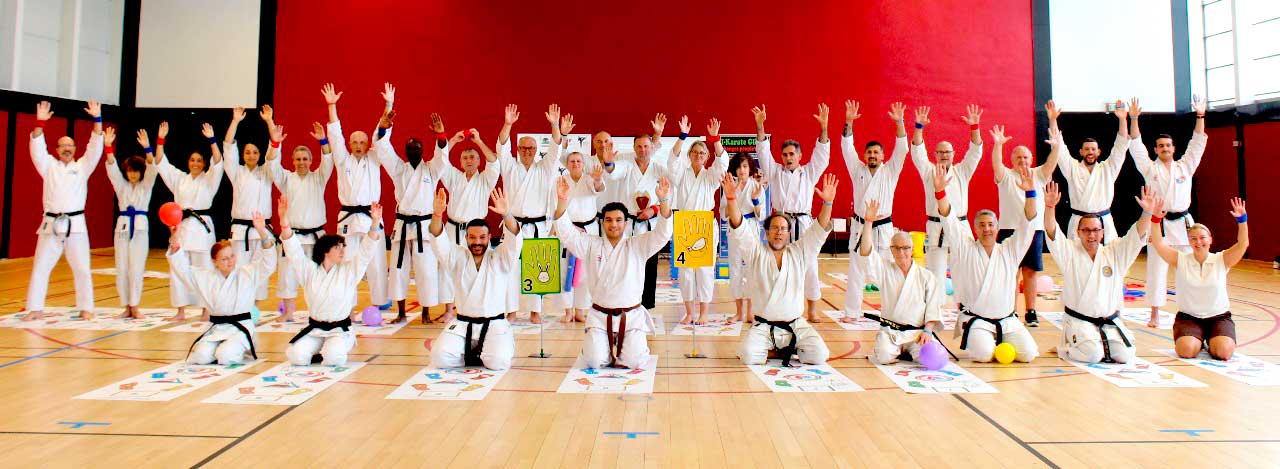
Conclusion of the inclusive karate session © ITKF Archives
Shihan Gilberto Gaertner, Chairman of ITKF Global, offered a detailed and strategic analysis of the 32nd edition of the European Master Course. For the leader, the event exceeded expectations not only in terms of participation but also in the technical and pedagogical consistency of the activities. More than an update course, the gathering has become a space for institutional reflection and international alignment with the ITKF methodology, with a focus on the global standardization of exams, the expansion of instructor development, and the integration of science, tradition, and Budo values.
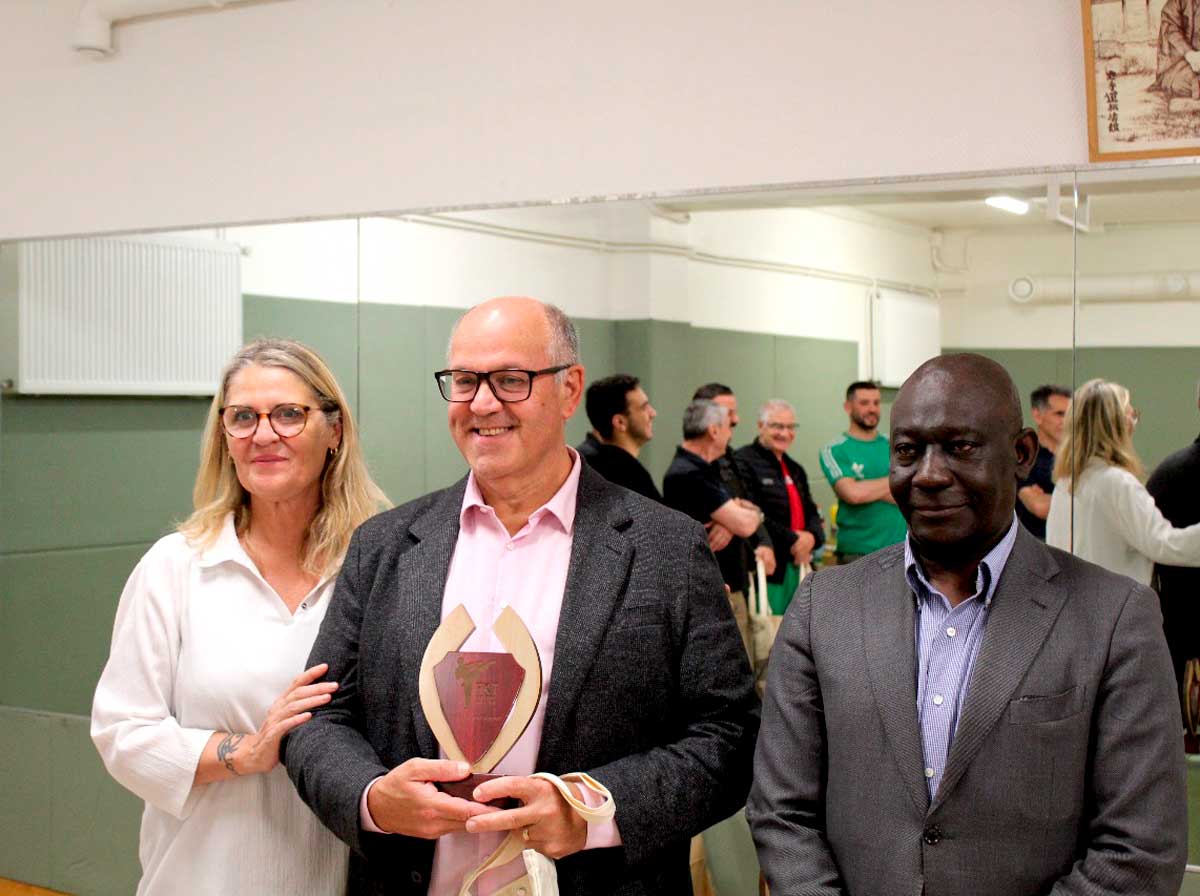
Sandrine El Marhoumy, Fernando Silva, and Epara Epency, Sports Director of the 20th arrondissement of Paris, at the closing celebration © ITKF Archives
“The Master Course had outstanding attendance, bringing together instructors from Europe, Africa, Asia, and the Americas. The emphasis on the new exam program was very well received by representatives from the 13 countries present. In addition, classes were held on refereeing, karate philosophy, Budo, and neurophysiology. Eric Bortels’ groundbreaking lecture on inclusion reaffirmed our commitment to expanding traditional karate for all.”
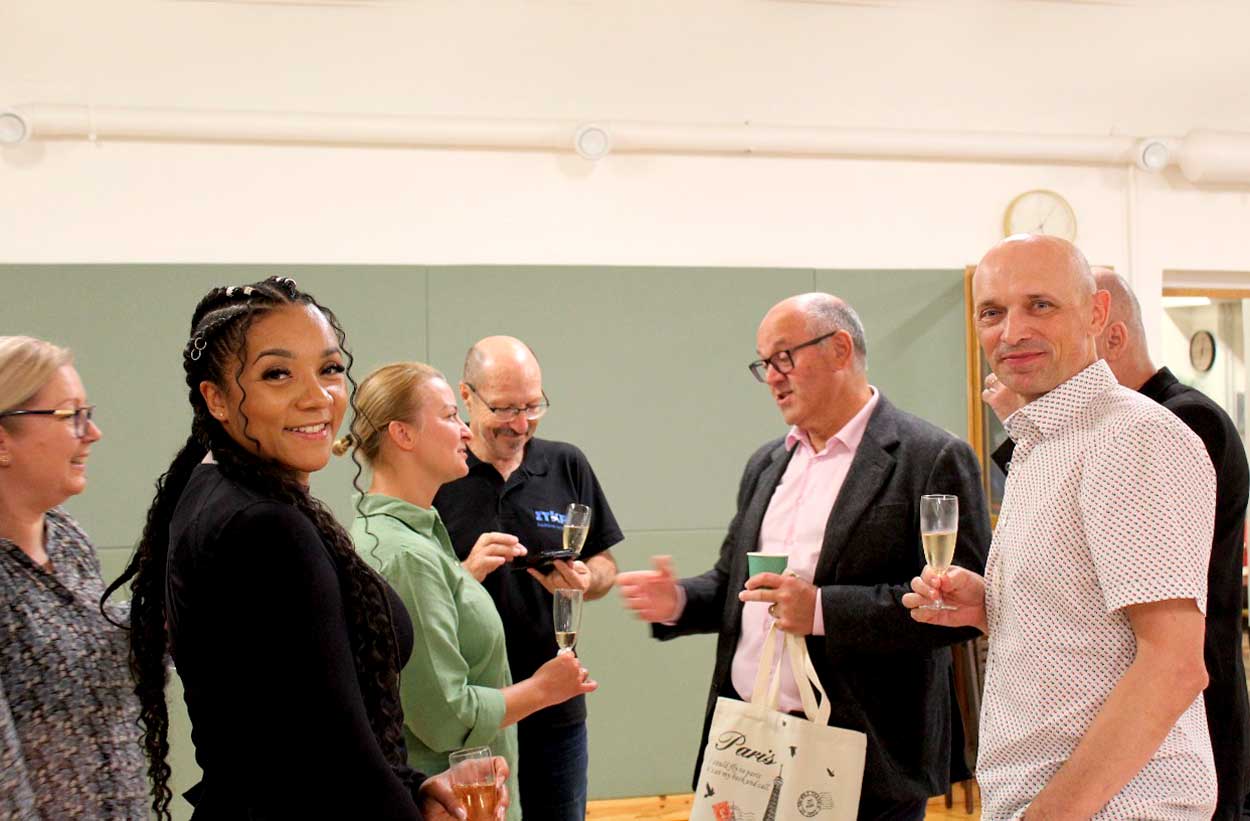
Social gathering © ITKF Archives
Gaertner highlighted the quality of the international mobilization, bringing together instructors from Europe, Africa, Asia, and the Americas, reaffirming ITKF’s identity as a truly global federation. He noted that “the emphasis on the san-dan and yon-dan exam content was very well absorbed by instructors from participating countries,” indicating that the certification program is becoming a high-quality global standard.
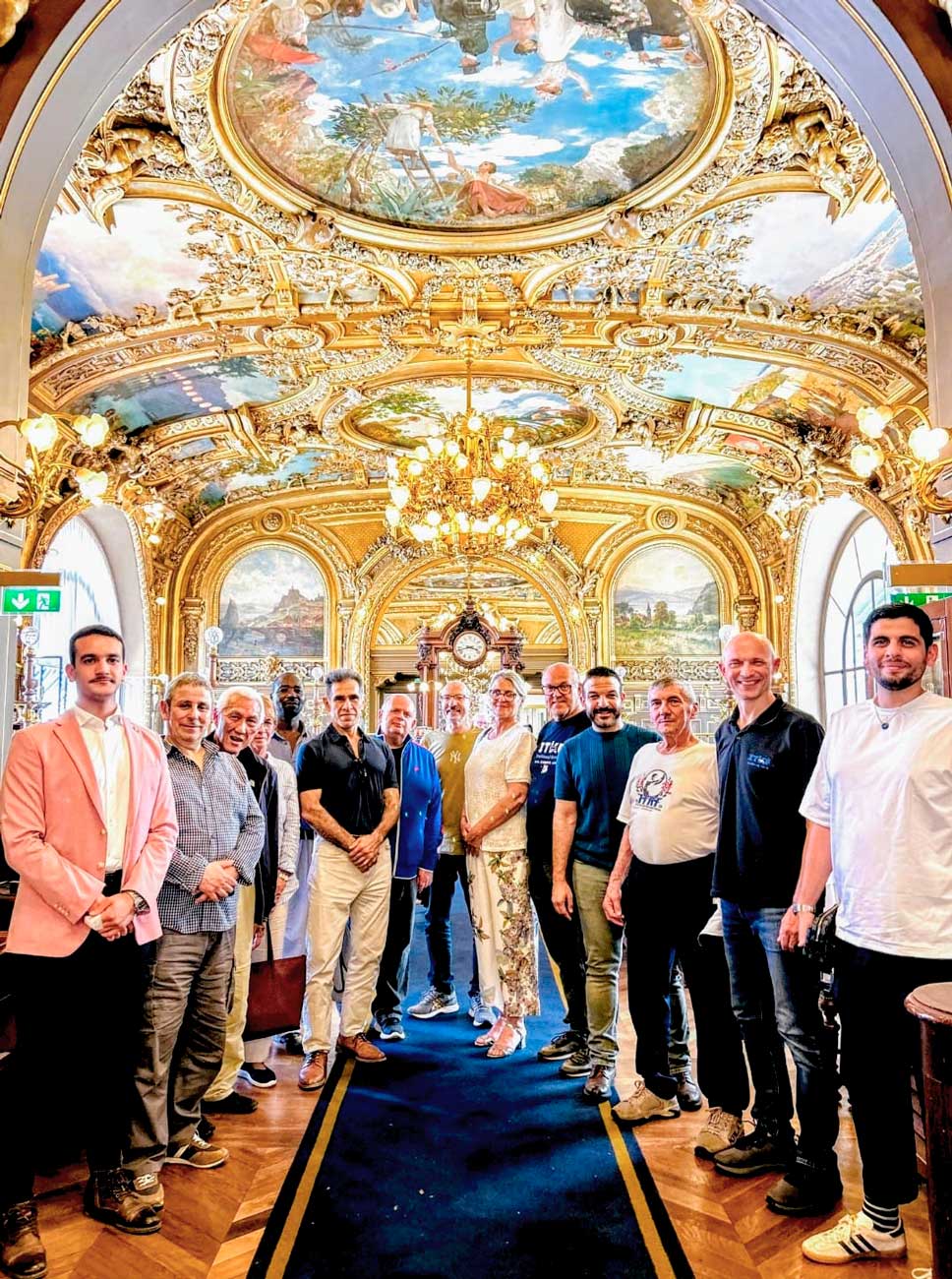
Lunch with ITKF Global, ITKF Europe, and ITKF France officials at the iconic Le Train Bleu restaurant © ITKF Archives
In his governance analysis, Gaertner emphasized the importance of continuously renewing the ITKF leadership teams as part of a broader plan to modernize its administrative and financial areas. He also stressed the need to expand institutional visibility through a well-structured and strategic communication plan.
This assessment reinforces the notion that ITKF Global event was not merely a technical and educational milestone but also a strategic leap in the governance of the discipline. The courses represented a crucial step in consolidating traditional karate as a global tool for education, health, inclusion, and the cultural transmission of Budō.
Regarding the participation of Professor Eric Bortels from Belgium, ITKF Global Chairman Shihan Gilberto Gaertner offered an emphatic and inspired assessment, highlighting the social and scientific impact of Bortels’ work.
“I found Sensei Bortels’ contribution to be extremely valuable. First and foremost, it’s important to recognize that what he’s developing is a truly inclusive karate model. We’re talking about an approach that addresses both neurodivergence and physical limitations—making it a wide-reaching initiative with powerful therapeutic potential.”
Gaertner noted that the Belgian professor shared several examples of his work, and his methodology stood out for its solid scientific foundation and high pedagogical standards. “His presentation was structured in a way that sparked our interest in adapting this work to traditional karate,” Gaertner remarked. “I believe this is not only feasible—it’s necessary.”
The ITKF chairman pointed out that the timing of the presentation of this method was very appropriate. “We live in an era in which the prevalence of neurodivergences is growing globally, and there is still a long way to go to ensure adequate spaces for welcoming and developing these people. Seeing traditional karate consolidating itself as a means of integration, strengthening and autonomy for this group was one of the most significant experiences I have had in recent years. This is a vast field to be explored, and ITKF Global is fully capable of implementing this advance.”

08 de fevereiro de 2026
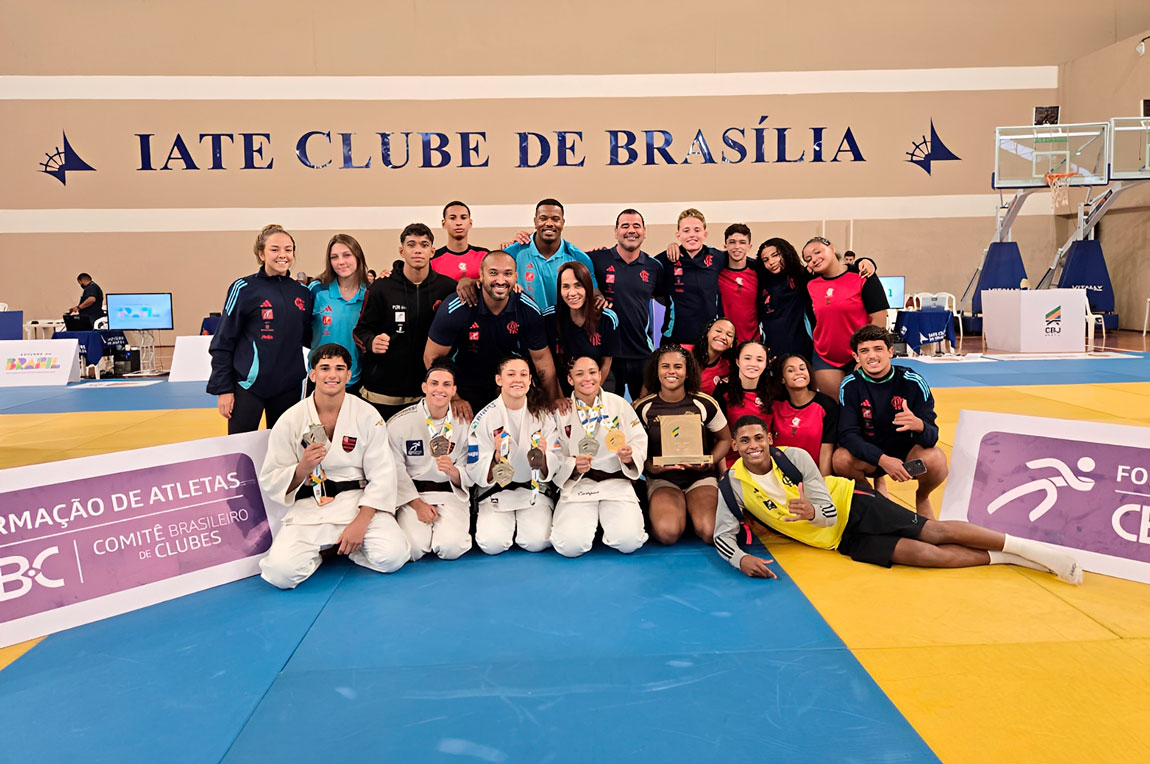
07 de fevereiro de 2026
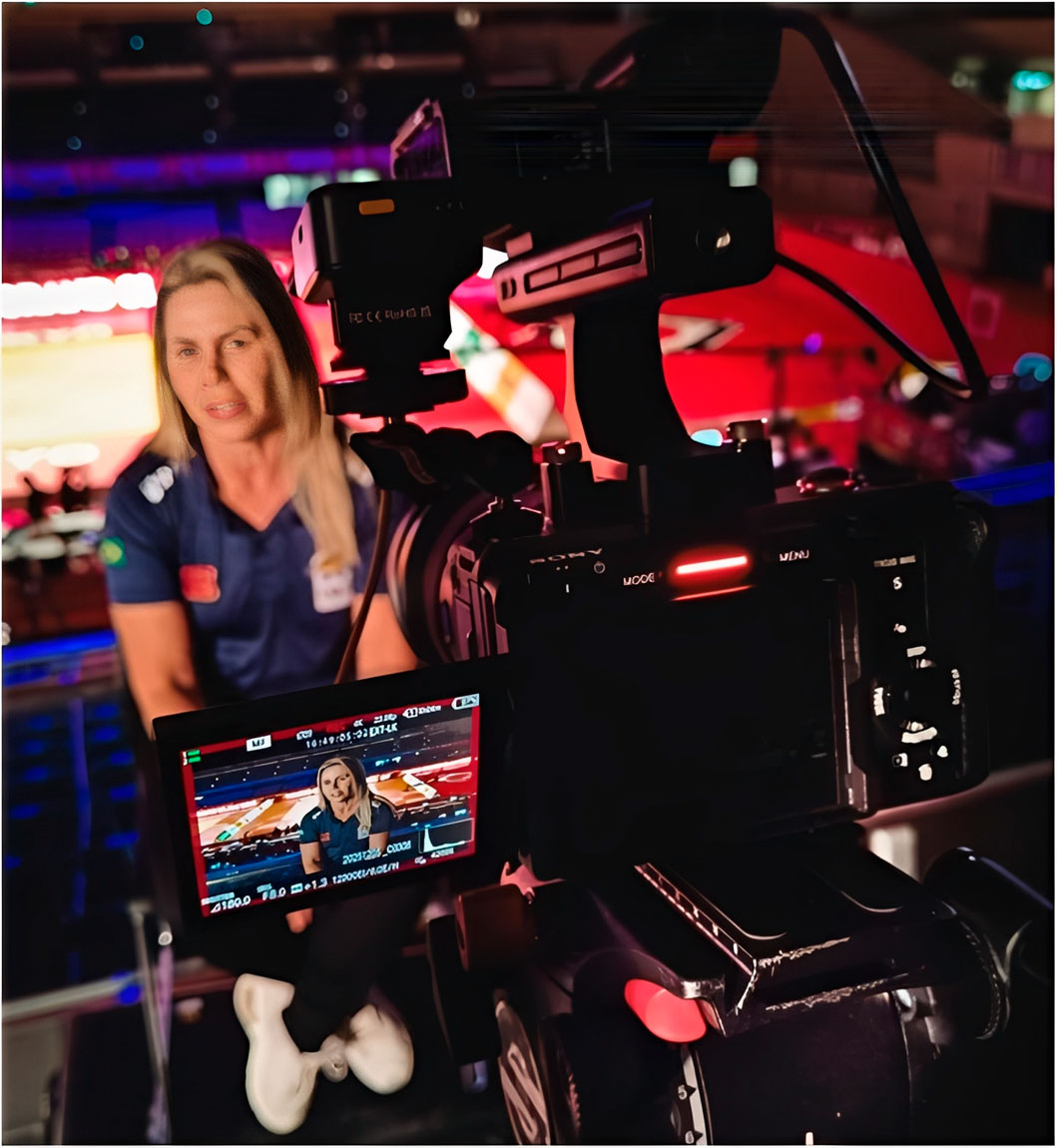
06 de fevereiro de 2026